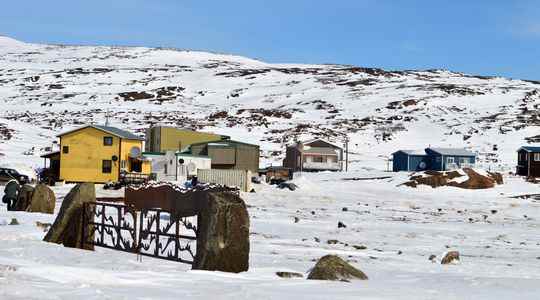Collins Tagnigou, nurse and coordinator of clinical and anesthesia services at the Qikiqtani General Hospital in Iqaluit, provides care in three languages: mainly English, French and Inuktitut, the language of the Inuit, who are the vast majority in the Territory of Nunavut, which counts almost 40,000 inhabitants. Since arriving with the family in 2017, after studying in Italy and several years in Montreal, he has indeed learned “a few words, a few phrases of Inuktitut, he says. But for home care, I need ‘a translator”.
The hospital also has a translator for French. Because Francophones – Quebecers, Franco-Ontarians, Franco-Manitobans, Afro-Canadians – are quite numerous: of the 7,700 inhabitants of Iqaluit, the capital, about 550 declare French as their mother tongue. The Trois-Soleils school, where Collins Tagnigou’s wife works, welcomes a hundred children and provides education in French.
Need for manpower
Francophones are also united in associations such as Résefan, whose mission is to contribute to the well-being and improvement of the health of Francophones in Nunavut, the Association des francophones du Nunavut and Carrefour Nunavut, which monitors the economic development of the Territory and the hiring of newcomers. “We have shortages in many sectors: construction, because there is a lack of housing, education, mining, tourism, declares Charlotte Lapothe, in charge of communication and special projects for Carrefour Nunavut. But health is an issue. particular.” Because the needs are great and the lack of personnel is obvious, especially since there is no possibility of training in the sector locally: you have to go to Ottawa or elsewhere.
“The Inuit form a particularly close-knit community and their very rich culture is still struggling to adapt to certain technical aspects. In addition, the prospect for young people of finding themselves alone in the South sets them back. This However, it is starting to change”, notes this Burgundian, installed on the spot since February 2020, at the end of her Working Holiday Permit.
Career opportunities
In the meantime, Collins Tagnigou is doing two days in one, as are the handful of caregivers, especially in the emergency room. No wonder Nunavut wants to welcome doctors and nurses from elsewhere! “As we have a care unit covering all patient needs, from surgery to pediatrics and childbirth, caregivers will have very good versatility and therefore great employability.”
“Even more than the rest of Canada, Nunavut is a place where you can develop professionally and personally. I myself am an illustration of this since I took a higher position here than in Quebec” , argues Collins Tagnigou. In addition to career prospects, salaries, given the high cost of living, are better and the pension system generous. Without forgetting the satisfaction of being useful to the community that Collins Tagnigou feels.
community spirit
“It is certainly necessary to tame the cold and the polar night, to like hunting, fishing and hiking, but the landscapes are magnificent”, he adds. And then there is this community spirit, which reminds him of his native Cameroon. “Some of my patients kiss me when they see me at the supermarket, or come to the hospital to bring me fish they caught,” he says. And he never worries when his three children play outside. “If there is a problem, the community will take care; here, mutual aid is the key word.” Thanks to this, Charlotte Lapothet also feels at home now. “In addition to nature at your fingertips, Iqaluit has a cinema, a swimming pool, a library, and offers free activities of all kinds,” she lists. Like the Tagnigou family, she intends to enjoy it for a long time.
